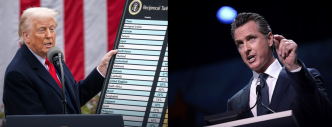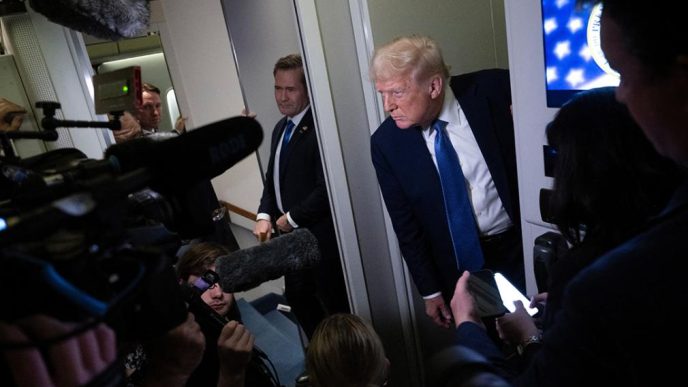California officials on Wednesday filed a federal lawsuit challenging President Donald Trump’s use of emergency powers to enact tariffs.
The tariff plan hurts states, consumers and businesses, according to Gov. Gavin Newsom and state Attorney General Rob Bonta. Noting that California is the largest economy in the nation with the most robust manufacturing and agricultural sectors, the lawsuit argues that Trump does not have the authority to unilaterally implement tariffs by invoking the International Economic Emergency Powers Act, or IEEPA.
These tariffs have disrupted supply chains, inflated costs for the state and Californians, and inflicted billions in damages on California’s economy, the fifth largest in the world.
“President Trump’s unlawful tariffs are wreaking chaos on California families, businesses, and our economy — driving up prices and threatening jobs,” Newsom said in a statement. “We’re standing up for American families who can’t afford to let the chaos continue.”
According to Bonta, “The president’s chaotic and haphazard implementation of tariffs is not only deeply troubling, it’s illegal. As the fifth largest economy in the world, California understands global trade policy is not just a game. Californians are bracing for fallout from the impact of the president’s choices — from farmers in the Central Valley, to small businesses in Sacramento, and worried families at the kitchen table — this game the president is playing has very real consequences for Californians across our state.”
Trump has pledged to reverse free-trade policies.
“For decades, the United States slashed our trade barriers on other countries, while those nations placed massive tariffs on our products and created outrageous nonmonetary barriers to decimate our industries,” the president told reporters last week at the White House. “They manipulated their currencies, subsidized their exports, stole our intellectual property, imposed exorbitant VAT taxes to disadvantage our products, adopted unfair rules and technical standards and created filthy pollution havens. This all happened with no response from the United States of America, but those days are over.”
The lawsuit was filed in the United States District Court for the Northern District of California. It seeks a court declaration to nullify the tariffs.
California officials are challenging Trump’s authority to unilaterally implement tariffs on products from Mexico, China and Canada and create an across-the-board 10% tariff.
Claiming unprecedented authority under the IEEPA, Trump has issued several executive orders placing 25% tariffs on Mexico and Canada and a universal 10% tariff on every other U.S. trading partner, according to the lawsuit.
Trump has also “goaded China into a full-blown trade war, with tariffs reaching 145% on Chinese goods, and China imposing reciprocal 125% tariffs on U.S. goods,” according to a statement from Bonta’s office. The president also has imposed reciprocal tariffs of up to 50% on nearly 90 specific countries that are currently on hold for 90 days before taking effect.
“Once the 90-day ‘pause’ expires, the harms will only compound further,” according to the AG’s office. “And new tariffs are being contemplated or announced nearly every day.”
The IEEPA, enacted in 1977, gives the president authority to take certain actions if he declares a national emergency in response to threats to national security, U.S. foreign policy or the economy. The law specifies the actions the president can take, but imposing tariffs is not one of the options.
“This is the first time a president has attempted to rely on this law to impose tariffs,” according to Bonta’s office.
A key argument in the lawsuit relies on the U.S. Supreme Court’s “major questions doctrine,” which holds that during uncommon circumstances of heavy economic and political significance, federal agencies and the president must have authorization from Congress.
State officials pointed to recent Supreme Court decisions regarding President Barack Obama’s Clean Power Plan and President Joe Biden’s student loan forgiveness initiative. Justices ruled that executive actions that have broad impacts on the national economy can’t be based on unclear legal authority.
“It is difficult to imagine a more economically significant set of actions than the one Trump is taking on tariffs, which have inflicted hundreds of billions of dollars in economic losses on a whim, using a statute that doesn’t mention tariffs,” according the statement from Newsom’s office.
California’s gross domestic product was $3.9 trillion in 2023, 50% larger than the GDP of the nation’s second-largest state, Texas. Newsom’s office noted that California “sends over $83 billion more to the federal government than it receives in federal funding.”
Last year, California engaged in nearly $675 billion in two-way trade, which officials said supported millions of jobs statewide. California is heavily dependent on international trade, particularly with Mexico, Canada and China, the state’s top three trade partners. More than 40% of imports to California come from those countries, totaling $203 billion of the over $491 billion in goods in 2024.
Mexico, Canada and China are also the state’s top three destinations for nearly $67 billion in California exports, which was over one-third of the state’s $183 billion in exported goods last year.
Bonta’s office noted the impacts of “Trump’s dizzying array of tariff plans have already wreaked havoc on our financial systems: the U.S. stock market suffered the largest two-day loss in its history in the two days following the announcement of … Trump’s most sweeping tariffs. These actions and the near-daily threats to impose new tariffs have already inflicted and continue to inflict serious financial harms on California.”
A copy of the lawsuit’s court filing is available online.













